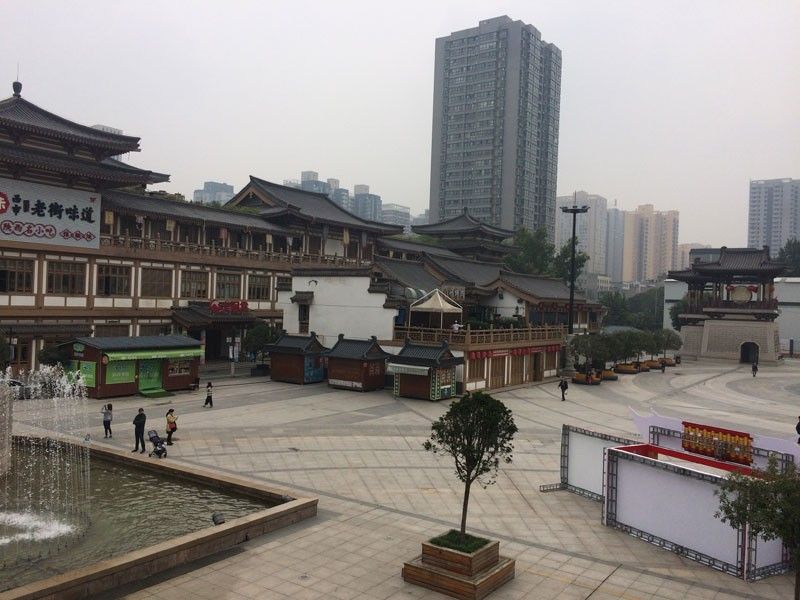Pinoy traders urged to set up shops in China’s Silk Road district

XI ’AN CITY, CHINA - Filipino businessmen are urged to consider opportunities in the revived Tang West Market here, the site of the ancient market district that spurred activity in the famed Silk Road trade route.
Industry and commerce in the Tang Dynasty were concentrated in two city markets, the East and West. The East Market was mainly for domestic trade and it was in the West Market where international trade flourished and paved the way for the flow of goods along a trade route that extended all the way to the rest of Asia, Africa, and even Europe.
It its heyday, the West Market had more than 40,000 local and foreign merchants running businesses in 220 categories and a customer traffic of 150,000 daily. Thanks to this racial and cultural diversity, the Tang Dynasty became China’s golden age of commerce and culture.
Today, it is a 100-hectare site with commercial and cultural components that reflects it’s origin as a multicultural hub. Alongside shopping malls are food stalls and restaurants, an eponymous hotel, a museum with an auction center, an antiques center, a cultural center for selling specialty products, a performing arts center, and an international exhibit hall.
The third phase of the market covering more than 10 hectares is now being developed. In about two year’s time, a 50-story twin tower project will rise in this section, providing more residential and commercial spaces.
Hu Ji, consultant of the Tang West Market Cultural Industry Investment Group Co., Ltd. said that as a group intends to maintain the
multicultural aspect of the market, there is a big opportunity for businessmen who can bring in authentic Filipino cuisine, specialty products, and antiques dating back to at least 300 years ago.
There is already a proliferation of foreign food in the market especially in the cultural street where delicacies from all over the world are sold.
Philippine companies, he said, are also welcome to set up travel agencies promoting tourism destinations to the Philippines.
“We want the best from the Philippines,” Hu told visiting journalists.
To entice businessmen to set up shop in the West Market, Hu said the Tang West Market Group (TWMG) provides several forms of assistance as co-financing of investments and direct financing in the form of loans as well as outfitting of shops.
Foreign businesses are also allowed to retain 100 percent ownership of their enterprise and do not have to partner with Chinese firms.
Businesses in the Tang West Market stand to benefit from a large tourist traffic that can reach up to as much as 100,000 daily during national holidays such as Spring Festival (Chinese New year), said Hu. As the ancient capital of the Tang Dynasty, Xi ‘ An has retained much of its cultural heritage, becoming of the China’s top tourism sites.
For businessmen who wish to relocate to Xi ‘An to oversee their investments, the cost of living in the city also remains competitive, said Hu. The cost of opening a business in the West Market, meanwhile, is considered on a par with Thailand’s.
The revamp of the Tang West Market started in 2002 and reached its investment-ready state in 2009.
Other than its commercial spaces, the market boasts of a multi-function market square used for cultural events and and for enjoyments by the city’s residents. At night, especially on weekends, it’s normal for people to congregate in the square to socialize and pursue leisurely activities such as exercising in groups.
The TWMG is a private enterprise with RMB50 million in assets. Its businesses include cultural-driven enterprises, finance, trade logistics, as well as real estate development and management.
The revival of the Tang West Market is aligned with the China’s ambitious Belt and Road Initiative (BRI) which aims to connect Asia, Africa and Europe via infrastructure, trade, and investments. TWMG Chairman Lu Zianzhong is also the chair of the Silk Road Chamber of International Commerce (SRCIC), a confederation of 129 business chambers from 77 countries worldwide which support the BRI program.
In the Philippines, the SRCIC is headed by Francis Chua, chairman emeritus of the Philippine Chamber of Commerce and Industry (PCCI) and chair of the International Chamber of Commerce Philippines.
- Latest


























